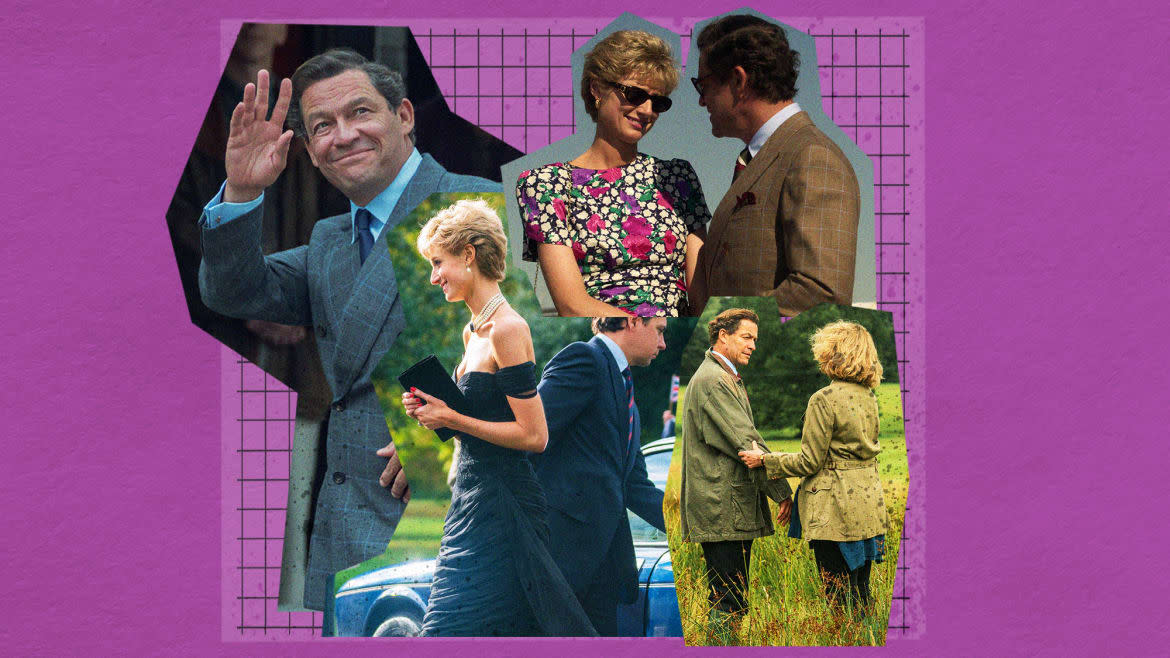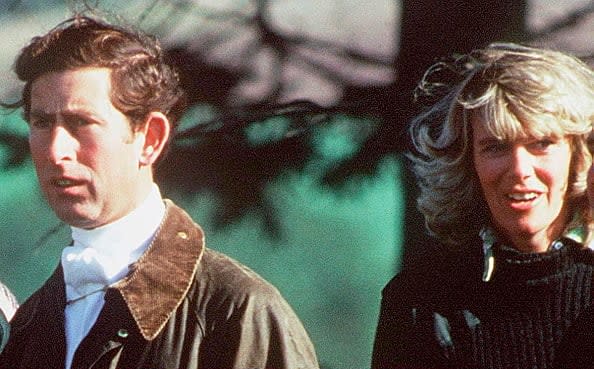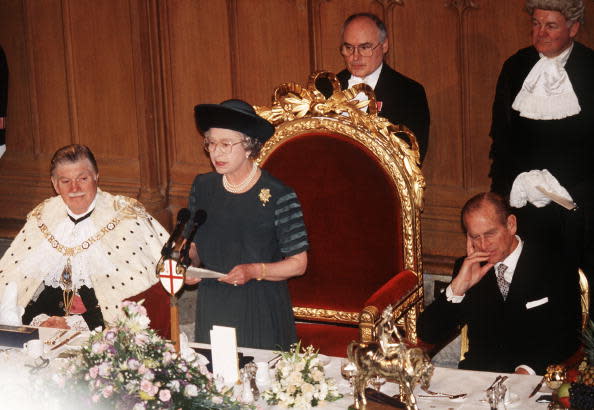‘The Crown’ Is Not Reality, but It Is Also Not Crazy Fiction

- Oops!Something went wrong.Please try again later.
- Oops!Something went wrong.Please try again later.
- Oops!Something went wrong.Please try again later.
Royalist is The Daily Beast’s newsletter for all things royal and Royal Family. Subscribe here to get it in your inbox every Sunday.
Advance copies of Netflix’s tentpole show of the autumn season The Crown have been distributed to the media under strict embargo, but that hasn’t stopped Britain’s Daily Mail bravely charging in with their anything-but-humble opinion, exploring exactly all the things that the clearly fictionalized account of the royal family’s life behind closed doors has got wrong.
The royals themselves, of course, have never directly commented on the show with the exception of Prince Harry who told James Corden that the show was clearly “fiction” and that he was much more concerned about newspapers peddling lies about him and his family which were presented as fact.
‘The Crown’ Is ‘Malicious Fiction,’ Says Former British Prime Minister John Major
It is an entirely reasonable point for Harry to make, although there is admittedly a conflict of interest here, given Harry and Meghan’s multi-million dollar production deal with Netflix. Some have criticized Netflix for not making clear on screen these are fictionalized versions of real-life events. Apparently, this season just such a disclaimer will be added.
That aside—just what is in the new series, and what does the Mail reckon it has got wrong or handled badly?
The Mail said in its piece published Wednesday that the depiction of Prince Charles is “relentlessly negative,” and bemoaned the fact that there was no on-screen note referring to Queen Elizabeth’s death in September or paying tribute to her.
But what if, on reflection, Charles had behaved badly in that period of time, especially towards Princess Diana. Is that not a truth—an uncomfortable one, but no fiction?
And why on earth would there be any reference to the queen’s death for a show set in the 1990’s? The Crown is not the Court Circular.
The Mail seems particularly aggrieved by scenes suggesting Charles wanted his mother to abdicate to allow him to be king, including at a fictional dinner party where he reportedly laments: “And how does one describe being Prince of Wales? It’s hardly a job, still less a vocation. What am I? I’m just a useless ornament stuck in a waiting room gathering dust. There I go again—always a little whine with my cheese.”
Former PM John Major has attacked Netflix for a scene in which Charles is shown trying to recruit him to a plot to oust the queen.
While there is no doubt these are fictional events, the larger point, that Charles was at various stages of his life, impatient for the throne, is widely accepted to be true.

Charles and Camilla, pictured in 1979.
Indeed, in November 2001, Charles joked in an interview: “Impatient? Me? What a thing to suggest! Yes of course I am…I’ll run out of time soon, I shall have snuffed it if I’m not careful.”
The Mail is also unhappy about the depiction of the so-called Tampon-gate call, when Charles was caught on tape, allegedly by an amateur radio ham (although other more conspiratorial explanations have been offered over the years) telling Camilla he wanted to be reincarnated as her tampon.
The Mail’s fury is not that Netflix is inaccurate–how could it be when the call itself was published in full in 1993—but that it is in bad taste.
The Mail must imagine its readers have lived very sheltered lives if they suspect this well-known matter of public record will have them reaching for the smelling salts.
And also, the call happened, this is how Charles described itself. The Crown would be guilty of the very thing its critics always bash it for—being a truly bad or lacking chronicler of royal history—if it omitted this.

Princess Diana in her “revenge dress” in 1994.
The Mail is dismayed that excerpts from the tape are voiced over scenes of other royals reacting to them, saying that “Charles and Camilla’s voices humiliatingly echo out as a perverse soundtrack.”
However, the whole point of why the tape was so “humiliating” is that it was made available to the public to listen to on a premium phone-line by the People newspaper. Millions dialed in to hear the exchange.
The Mail also takes issue with Charles’ 1994 interview with Jonathan Dimbleby, in which he confessed to adultery, objecting that Camilla is shown watching it at her home with her then-husband Andrew, who subsequently angrily leaves the room. It seems odd to quibble over what is clearly an invented scene meant to portray how deeply Andrew Parker Bowles was humiliated by Charles’ admission of having an affair with his wife. Again, the scene itself may be fiction; the emotions it shows ring true.
The Daily Beast has already covered Netflix’s interpretation of Philip’s friendship with Penny Knatchbull. The Mail professes to be aghast at suggestions they may have had an affair. The reality is that Prince Philip was widely rumored to be a serial adulterer. Not to even allude to this would be a real travesty.
The Mail is also unhappy at scenes depicting William at Eton on the day the Martin Bashir interview airs, “going about his day unprepared for what is about to be unleashed.”
It’s hard to see what the complaint is here. William was told by his mother that she was doing an interview with the BBC, but he had no idea of the extent of the revelations she would make. Indeed, the Mail has itself reported that a shocked Prince William watched the interview in his housemaster’s private rooms at Eton in tears.
In one flashback scene, the Mail says, “King George V is approached by the then-prime minister Lloyd George who offers to provide a ship to rescue his cousins, the Tsar and Tsarina of Russia, and bring them to Britain in 1917.”
However when the royals don’t offer their support, The Crown says, the offer is withdrawn.
Even the Mail is forced to conclude the story is largely true, saying that historians agree that “George V could have played a more effective role in trying to help his Russian relatives,” but attempts to mitigate his blame by saying that “he was known to have written to them expressing concern for their welfare.”

Queen Elizabeth II makes her “annus horribilis” speech in 1992.
One is sure they were thrilled to receive the letter, but the larger point, surely, is that throughout history the royals have ruthlessly protected the institution at the expense of individuals.
The Mail criticizes a scene showing Camilla meeting Charles’ spin doctor Mark Bolland, before conceding that “she would have had limited conversations with the spin doctor,” but that “the meeting in question is an invention.”
Well, duh.
It is, however, hard to disagree with the Mail’s opinion that a scene when Charles unexpectedly visits Diana after the divorce is finished, and flirts with her as Diana makes him a ham omelet is “even hammier than the soggy mess he is eating”—and entirely fictitious in both letter and spirit.
But, as most Crown fans know—and indeed enjoy—this a soap opera, not a documentary.
Got a tip? Send it to The Daily Beast here
Get the Daily Beast's biggest scoops and scandals delivered right to your inbox. Sign up now.
Stay informed and gain unlimited access to the Daily Beast's unmatched reporting. Subscribe now.

